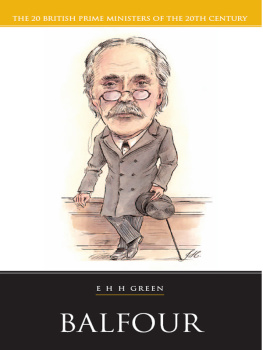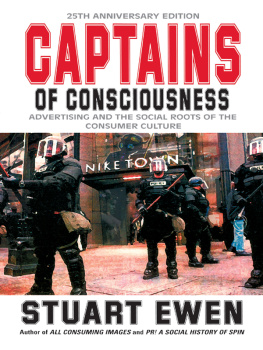First published in Great Britain in 2006 by
Haus Publishing Limited
26 Cadogan Court
Draycott Avenue
London SW3 3BX
www.hauspublishing.co.uk
Copyright E H H Green, 2006
The moral right of the author has been asserted
A CIP catalogue record for this book is available from the British Library
ISBN 1-904950-55-8
Designed by BrillDesign
Typeset in Garamond 3 by MacGuru Ltd
Printed and bound by Graphicom, Vicenza Front cover: John Holder
CONDITIONS OF SALE
All rights reserved. No part of this publication may be reproduced, stored in a retrieval system, or transmitted in any form or by any means, electronic, mechanical, photocopying, recording or otherwise, without the prior permission of the publisher
This book is sold subject to the condition that it shall not, by way of trade or otherwise, be lent, re-sold, hired out or otherwise circulated without the publishers prior consent in any form of binding or cover other than that in which it is published and without a similar condition including this condition being imposed on the subsequent purchaser
Introduction by Francis Beckett
Arthur Balfour has been treated less than kindly by historians, so I am pleased that the distinguished scholar Ewen Green has done something in this book to restore his reputation. As Green shows, Balfour was a much more substantial politician than he is normally given credit for.
The greatest Prime Ministers are great change-makers Clement Attlee and Margaret Thatcher spring to mind. But at the next level down are the great change managers, like Stanley Baldwin and Harold Macmillan. And Balfour can put up a respectable argument for joining this second distinguished group, especially if one counts what he did after being Prime Minister into the balance. For in his career, he saw, embodied, and managed, the most profound changes in British society, no less important because they were invisible to many of his contemporaries.
When Balfour was defeated at the 1906 general election, and his successor H H Asquith went to meet the King and kiss hands, the new Prime Minister travelled by himself on the scheduled train to Biarritz where Edward VII was wintering. There was not even a private secretary, let alone a security guard, to accompany him. Thats as graphic an illustration as youll find of the distance we have travelled in those 100 years.
Heres another. Balfour was the last of the Cecils to hold high office that great political family whose members had helped to govern the country ever since a Cecil was the key adviser to Elizabeth I. His uncle and immediate Prime Ministerial predecessor, the third Marquis of Salisbury, was the last peer to occupy 10 Downing Street, having been Conservative leader from 1884 to 1902.
The Premiership must have seemed to the Cecils a little like a family business whose proprietors were Englands great families. Hilaire Bellocs lachrymose Lord Lundy was told by his ducal grandfather:
We had intended you to be
The next Prime Minister but three:
The stocks were sold; the Press was squared:
The Middle Class was quite prepared.
But as it is! My language fails!
Go out and govern New South Wales!
Yet less than a decade after Balfour succeeded his uncle as Prime Minister in 1902, the aristocracy was looking on in impotent rage as its powers were drastically trimmed by the hoi polloi. Balfour, by then the Conservative Leader of the Opposition, found himself unable to save them from the advance of a democracy which they perceived as something akin to the end of civilisation.
During this crisis Lloyd George called the House of Lords Mr Balfours Poodle but, as Dr Green shows, the peers were in no mood to take orders from a politician they suspected of being willing to compromise on the sacred rights of the landed gentry. As Stephen Bates writes in the Asquith biography which appears in this series, They wanted more vigorous, less scrupulous leadership.
But as Conservative leader, he was, at least nominally, at the head of a splenetic aristocracy whose mood was summed up, once again, by Hilaire Belloc. As a Liberal MP, elected in 1906, who lost his seat in 1910 in one of the elections which resulted in the Parliament Act, Belloc knew the people he was writing about :
During a late election Lord
Roehampton strained a vocal chord
From shouting very loud and high
To lots and lots of people why
The budget in his own opin
-Ion should not be allowed to win.
He sought a specialist who said :
You have a swelling in the head :
Your larynx is a thought relaxed
And you are greatly over-taxed.
I am indeed! On every side !
The Earl (for such he was) replied
In hoarse excitement. Oh ! My Lord,
You jeopardize your vocal chord
Broke in the worthy specialist.
Come ! Heres the treatment ! I insist !
To Bed ! To Bed ! And do not speak
A single word till Wednesday week,
When I will come and set you free
(If you are cured) and take my fee.
On Wednesday week the doctor hires
A Brand-new Car with Brand-new Tyres
And Brand-new Chauffeur all complete
For visiting South Audley Street.
A Scutcheon hanging lozenge-wise
And draped in crepe appals his eyes
Upon the mansions ample door
To which he wades through heaps of Straw,
And which a Butler, drowned in tears,
On opening but confirms his fears.
Oh ! Sir ! Prepare to hear the worst !
Last night my kind old master burst.
And what is more, I doubt if he
Has left enough to pay your fee.
The Budget With a dreadful oath,
The Specialist, denouncing both
The Budget and the House of Lords
Buzzed angrily Bayswaterwards.
No wonder then, as the spokesman and leader of men like that, that Balfours image today is that of a grumpy aristocrat, rather as though he were one of Bertie Woosters uncles. And no wonder, since for all their fulminating, the Lords lost, that Balfour as their leader is seen as a rather louche public schoolboy. Add to that his dislike of detail and his interest in philosophy, and you have the very model of an English dilettante, as out of place in the driven Downing Street of Lloyd George as he would have been in Harold Wilsons technological white heat.
In his Defence of Philosophic Doubt, published in 1879, Dr Green tells us that Balfour sought to offer a defence of scepticism against what he saw as the prevailing philosophical trend of scientific naturalism. And what, the professional politician might ask, does this have to do with the price of fish, or the balance of trade or the growth of the German army? Not a thing, Balfour might have replied, and that is one of the best things about it. Add to this his dreadful, foolish snobbery; the facts that he led his party into three general elections and lost the lot ; and that he is the only sitting Prime Minister in the 20th century to lose his own parliamentary seat (a feat he achieved in the Liberal landslide of 1906). Perhaps it is no wonder that we think of Balfour as a languid amateur.

But we are wrong. He was a substantial politician, an accomplished parliamentarian, an interesting and original economic thinker, and he had real achievements to show for a life in the trade of politics. These achievements began earlier. Eric Midwinter, in the book on Lord Salisbury in this series, notes : Balfour won his spurs as Irelands Chief Secretary, dealing out a mix of coercion and concession with imperturbable flair, despite being branded Bloody Balfour by his angry opponents. He did not settle the Irish question no one did at the time, and no one has since but he did, more or less, keep the lid on it during his watch, and he understood better than most Conservatives that Britain could not hold down Ireland forever.













